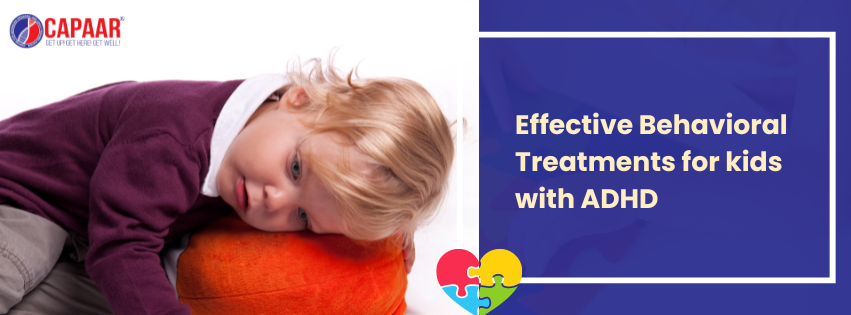ADHD Center Near Me Bangalore | CAPAAR
Children who have ADHD face various challenges in their daily lives. The battle becomes tough for the little ones as they are too young and vulnerable to understand why they are different from other children of their age or why society treats them differently.
Kids showing ADHD symptoms are mainly found to have impulsive behaviour. They throw unnecessary tantrums. They may not sit in a particular place. They also show sudden temper or emotional outbursts in situations that could be controlled otherwise. Also, it becomes difficult and quite stressful for parents or caregivers to manage such situations at home or in social gatherings.
Apart from medications, doctors consider behavioral treatments as a crucial step for treating ADHD in the little ones. Behavioral treatment aims to bring a positive change in kids that helps them showcase their feelings and emotions calmly and peacefully.
Strategies to consider for behavioral therapies for your little ones with ADHD
The first step of behavioural strategies is to train parents and caregivers to understand, cope, and respond to ADHD symptoms in a meaningful and logical manner. In this way, the little ones will feel more secure and appreciated.
Now, let us take a look at the strategies that will bring behavioral changes in kids with ADHD.
- Set smaller goals
It becomes difficult for children to understand tasks that are given to them as a whole. They cannot comprehend bigger tasks. However, breaking up a bigger task into small sub-sections will make things easier for them.
For example, while giving children assignments, let them complete one task per day. It helps them to understand the tasks in a better way.
- Praises and rewards
Who doesn’t like to be appreciated and rewarded for completing tasks? – You, me, us, everyone does. So, when your child behaves well and shows good behaviour in school, at home, or in social gatherings, don’t forget to praise them. Make sure the praises and rewards you give them signify how much they are appreciated because of their good behaviour.
For example, play your kid’s favourite music, gift them their favourite talk, and shower praises like “Well done, young man!” and see how the little one finds happiness in such small gestures.
- Interaction and communication
From a very early age, communicate with your kid. Keep the interaction going as a child who has ADHD will look out for encouragement and support. As caregivers, it is essential to communicate to the kids about what you want them to do. Give them directions and supervise their actions with care and love.
For example, tell that little one to “Sit down” or “Keep the water bottle.” Also, let them do their daily tasks, like brushing their teeth, under adult guidance.
The bottom line is that effective strategies can bring about positive change in young minds. ADHD in children can be managed successfully with a little patience and a little care. Caregivers and elders must understand the requirements and provide positive reinforcements to ensure behavioral changes in their little one’s lifestyles.
Other ADHD related topics:
Podcast: 10 Common Myths and Facts about ADHD
What is the actual difference between ADHD and Autism
What measures can be taken at home for ADHD Child
Good Breakfast Ideas to Make ADHD Treatment Better
6 Reasons Identified – Delayed ADHD Diagnosis in Adults

